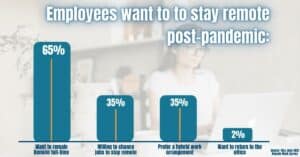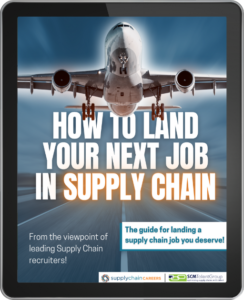
Building Your Virtual Supply Chain Career
The need to incorporate tactics for virtual career development in the supply chain world is paramount across end-to-end supply chain disciplines. Unlike many other industries, supply chain requires a lot of onsite and tactical prowess and experience. There simply are some supply chain jobs that cannot be done remotely. Now more than ever, there are more opportunities for growth in virtual supply chain careers.
The Long Play Towards Virtual Career Development
Rome wasn’t built in a day – and neither will your ability to thrive in a remote supply chain career. And as they say, anything worth doing is worth doing well. The good news is that the Covid-19 Pandemic has elevated the hybrid work environment to the forefront for employers around the world. Take just a second to think about how differently our work lives would have been impacted without today’s technology. If this Pandemic had hit even 10 years ago, the economic impacts would have likely been much more severe. Cloud computing was barely a thing in 2012. Most people’s laptops didn’t have the bandwidth to sustain video conferencing for long periods of time. In short, because of the technological advancements, many sectors withstood the disruptions and shutdowns with little to no interruptions. Some even thrived.
But then there was the supply chain…and we all know what happened there.
Everyone stayed home and started doing online shopping. Some supply chain experts pointed to as much as 5-7 years of growth in eCommerce in 2020 alone. This sudden shift in consumer behavior put a massive strain on supply chains, worldwide. What does this have to do with building a virtual supply chain career, you ask? Technology.
Building Towards a Virtual Supply Chain Career
If you were to listen to any number of our Supply Chain Careers podcasts, you will hear a multitude of executives detailing their supply chain career advancement stories. Most, if not all of them, started in a warehouse or distribution facility or even a grocery store. They were onsite, getting their hands dirty in the work of moving goods and products. They learned inventory planning and then demand planning or shipping and receiving and how to pick orders. Soon, they might have direct reports that include truck drivers (transportation), order pickers (inventory management), or analysts.
When you get off of the distribution center or warehouse floor and start running a team, your options for virtual supply chain career development expand greatly.

Tactics for Developing a Virtual Supply Chain Career
Let’s not overthink this too much. If you want to be trusted to work remotely, you have to do the things that elicit trust from your superiors and team members. This mantra holds across any and every employment sector. We all have to earn our freedom. That is done by ensuring that your levels of production hold steady regardless of if you are working onsite or not. There’s an old saying that says “integrity is doing the right thing when no one is looking.” Earning the privilege of remote employment falls under that umbrella.
Best Supply Chain Industries for Virtual Careers
As has already been mentioned, not all of the supply chain can be automated or accommodate hybrid work environments. There are a lot of tactical front-line positions that require hands-on activity. But, a lot of these positions are also evolving into part-time shift work and some of these employees are more and more free to adjust their schedules. However, working virtually will always be a problem for certain segments of the supply chain. We have come a long way and things like self-driving vehicles are continuing to push the technology envelope and create more virtual career opportunities.
Procurement
There are a lot of signs pointing to the procurement practice leading all supply chain disciplines in remote and hybrid working environments. A study by Gartner revealed that 61% of supply chain leaders polled believed that the pandemic created permanent changes to procurement working environments. There’s no putting the toothpaste back in the tube, so to speak. These changes are reflected in the stiff competition for supply chain talent. Employers are literally in a talent war and competing to land top-tier talent. In order to do so, they will have to cater to these emerging and evolving workforce demands.
If you have non-supply chain experience but analogous skills, you may want to consider transitioning into the supply chain world. Executives are panicked about the lack of available talent and worry that future success hinges upon the right personnel. It’s worth your time to research whether a transition is right for you. One thing is for sure: if you are looking to develop a career where you can work remotely and maintain a work-life balance, it’s wise to shop around candidate-driven markets. The supply chain has become just such a place.
Automation and Tech
The rapid evolution of tech and automation is fueling employers’ abilities to accommodate remote and flexible work environments in the world of supply chain. There was a time when it just wasn’t even possible to consider hybrid workspaces for management or frontline workers. However, in addition to streamlining communications and tracking across the entirety of the supply chain, these advancements in technology also have made it easier to develop supply chain roles with more flexible workspaces. Robotics, control towers, eCommerce, and fulfillment connectivity have not only made operations more cost-effective but have also created new roles and positions within the supply chain that may not have existed before.
The question is how do you prepare for these roles and what should you do to position yourself for consideration for the modernized supply chain? Clearly, a familiarity with communications platforms that ensure remote availability is paramount. Be sure to tailor your application to the position but also to the skills necessary for an increasingly remote work environment. Superior time management, communications skills, independence, and trust have become soft skills that employers are looking for when they hire for remote and hybrid positions.
Conclusion
What makes the supply chain one of the most intriguing and interesting career paths right now is how dynamic and fluid it has become. A career discipline that has always been marked by turbulence and disruption has become even more volatile in a pandemic and post-pandemic world. Supply chains are shortening and becoming more technologically advanced. There is an aging out of many roles which is opening up a flood of opportunities for students and professionals in other fields. And literally, every aspect of your life is touched by the supply chain. So as supply chain careers advance and evolve, so do the lives of everyday people everywhere around the world. Your career choice to enter supply chain couldn’t be better timed as talent is highly sought after and employers are eager to accommodate flexible and virtual career paths.
